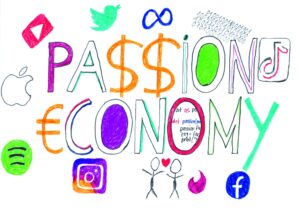“Leistung aus Leidenschaft” (“performance with passion”) was the long-term motto of Deutsche Bank – one of the largest German banks. They were in good company with other business entities that also relied on the term “passion” in their slogans. For example, Microsoft (“Your Potential. Our Passion”) or the car manufacturer Alfa Romeo (“Driven by Passion”). Obviously, the marketing professionals responsible for these slogans recognised the potential of the term. Passion is widely charged with emotions, wishes and desires, and the companies understood how to use this connotation cleverly for self-promotion. The fact that I even remember them indicate how effective they are. But the topic goes far beyond the mere design of slogans.
From personal experience, I can confirm that I certainly spend (too) much money on the things I’m passionate about; on mountaineering equipment or books that now barely fit on my shelves. I’m most likely not alone in this. It’s just so hard to resist the temptation to add yet another book to the pile of unread literature next to my bed when I’m standing in a bookstore. Successful companies have long recognised this fact and have tried to use people’s passions to place and sell their products.
Money from passion
Passion can take various forms, and not all of them seem to be immediately monetisable. However, some companies succeeded not only in selling a physical product or service, but also in arousing emotions and desires.
Case in point – the commercialisation of romantic passion. No, I do not mean sexual favours in return for payment, but products and symbols that play an apparently indispensable role in our love lives: Valentine’s Day, for example, originally a Christian holiday, has become associated over the last 200 years with commercial symbols such as chocolates, bouquets of flowers and other small gifts. Anyone who has ever visited a flower shop in mid-February or seen the displays of stores at this time knows what I mean. A much more recent development in the commercialisation of romantic passion are dating portals like Tinder, which promise more success in dating for a fee. Not to forget, ‘reality’ television formats such as The Bachelor or The Bachelorette, which generate high advertising revenues through the audience’s interest in openly displayed romantic passion.
Another strategy utilised by these companies to monetise passion is to create entirely new passions. Successful brands can themselves become the object of passion. In addition to the brand name, customers also buy a sense of belonging to a community or the expression of a certain attitude towards life. Just think of the presentations of new iPhones by Steve Jobs and the long queues in front of bookstores when a new Harry Potter volume was released. Monetised passions can also arouse around real people and celebrities: the death of Queen Elizabeth not only showed how much people identified with her – although most of them never have met her in person – but also highlighted the creativity of marketing companies in converting personal feelings into hard money.
Selling with passion
So far, commercialisation of passion was discussed from a customers’ point of view. But what about those people who sell products and services? Business consultants advise companies not to sell products, but experiences and feelings. They suggest using passion as a tool to convince customers of the need to make a purchase or sign a contract. It is, after all, psychology 1-0-1: people can better promote a product they themselves are deeply convinced of, so they approach the sale passionately. Countless posts on networks like LinkedIn underscore the importance of passion on the part of salespeople. In addition to enthusiasm for the things to be sold, many of the posts also shed light on the underlying sales culture, where the passion of salespeople is usually to achieve a sales target.
With the boom in start-up culture, we now often hear about entrepreneurial passion. Passion enables founders to sell their ideas to potential investors and future customers and to overcome scepticism, which often prevails with regard to new or unconventional business models. Research at the University of Singapore has shown that such passion can contribute significantly to the success of a start-up.
“Passion economy” – our future?
With the possibilities of almost unlimited self-expression and self-realisation on the internet, a new kind of commercialisation of passion has spread over the last ten years or so. The American journalist Adam Davidson coined the term “passion economy” in this context. By “passion economy”, Davidson means the creation of a business, brand or community based on a shared passion. While social networks so far aimed to capture as much of the user’s attention span as possible, Davidson argues, the new generation of passion-based platforms will build entire digital livelihoods around peoples’ passions. Examples are YouTubers and podcasters who earn a living from the revenues of their channels. According to a report by the World Economic Forum, these individuals, known as “creators”, will gain considerable economic influence in the coming years.
Are we now heading into a passionate economic future? While there is no definite answer, passion is not necessarily a guarantee for economic success, as evidenced by Deutsche Bank, which dropped its passionate slogan in 2017 to mark a transition after a series of financial scandals during which the slogan was often rewritten in German as “Leistung, die Leiden schafft” (“performance that creates suffering”).

by Lukas Valentin Graf
